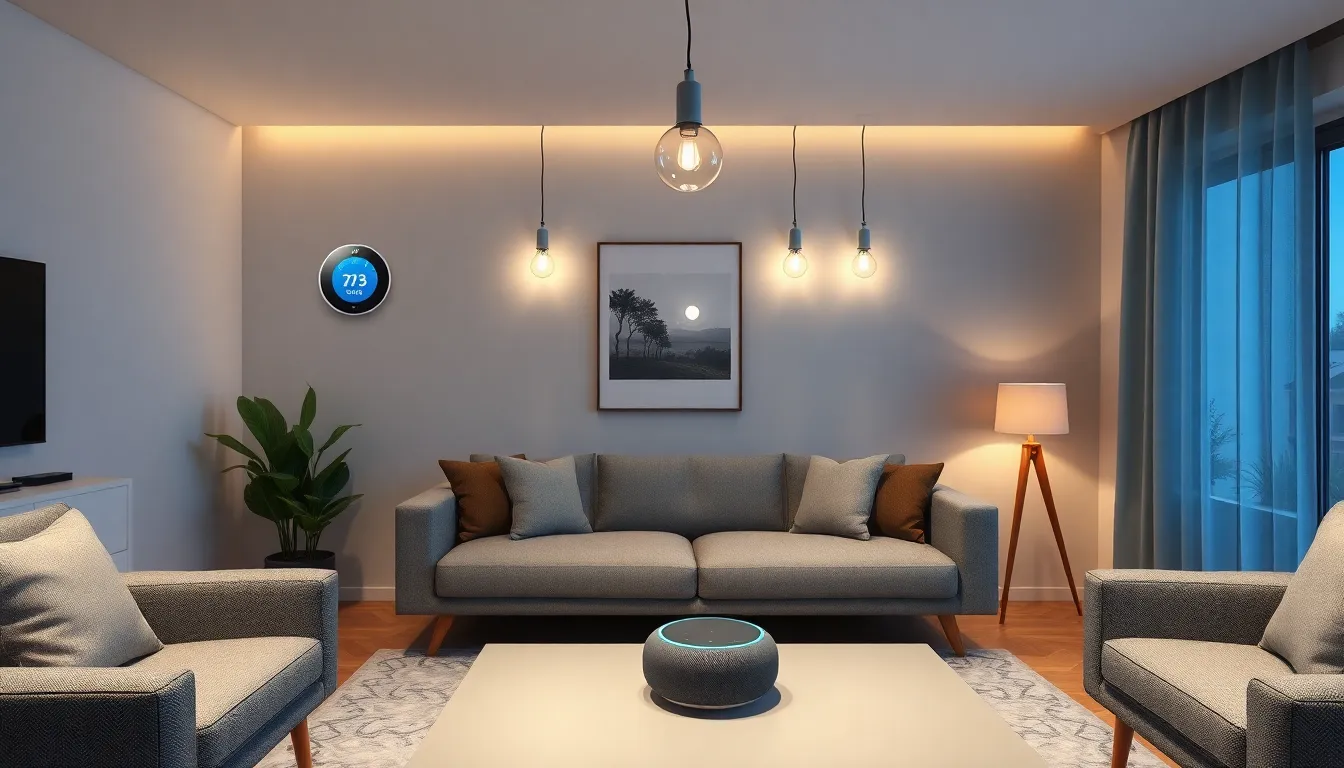Table of Contents
ToggleIn a world where even your toaster might have Wi-Fi, the home automation business is booming like never before. Imagine walking into your home and having the lights dim, the thermostat adjust, and your favorite playlist start playing—all without lifting a finger. Sounds like magic, right? Well, it’s not. It’s just smart technology making life a little easier and a lot cooler.
As homeowners crave convenience and efficiency, the demand for home automation solutions is skyrocketing. From security systems that can tell you when your cat decides to break into the pantry to smart fridges that remind you to buy more milk, the possibilities are endless. This isn’t just about gadgets; it’s about transforming everyday living into a seamless experience. So, if you’re considering diving into the home automation business, now’s the time to ride this wave of innovation and bring some high-tech charm to people’s lives.
Overview Of Home Automation Business
Home automation integrates technology into residential settings, enhancing convenience and energy efficiency. This sector not only provides innovative solutions but also transforms the way individuals interact with their homes.
Definition And Significance
Home automation refers to the control of various home systems through smart technology. Such systems include lighting, heating, cooling, and security. The significance lies in its potential to improve everyday life by offering greater efficiency and ease of use. As smart devices become more common, homeowners can manage their environments remotely, leading to energy savings and enhanced security. According to the Consumer Technology Association, the market for smart home devices is projected to grow significantly, indicating lasting consumer interest.
Current Trends In The Industry
The current landscape of the home automation business shows dynamic growth driven by advancements in technology. Demand for voice-controlled devices is escalating, with popular options like smart speakers becoming mainstream. Subscription-based home security systems offer convenience and reliability, appealing to a broader range of consumers. Additionally, interoperability among devices is gaining importance, allowing seamless integration across platforms such as Apple HomeKit, Google Assistant, and Amazon Alexa. Recent studies suggest a preference for eco-friendly products, reflecting rising consumer awareness about sustainability in technology.
Key Components Of Home Automation

Home automation consists of various components that work together to create a seamless living experience. Smart devices and connectivity solutions are essential for establishing an efficient smart home ecosystem.
Smart Devices
Smart devices form the backbone of home automation systems. These include smart bulbs, thermostats, cameras, and appliances. Users control devices like smart speakers for streaming music or smart locks for enhanced security. Each smart device contributes to improved convenience, allowing for remote management. Compatibility with platforms like Google Assistant and Amazon Alexa enhances integration. The versatility of smart devices supports a range of functions and preferences for homeowners.
Connectivity Solutions
Connectivity solutions ensure seamless communication within a smart home. Wireless technologies like Wi-Fi and Zigbee play crucial roles in device interaction. Robust connectivity allows devices to work harmoniously, enabling features like remote monitoring and control. Homeowners benefit from real-time data access and notifications. Strong connectivity facilitates the integration of various smart home systems, improving the overall user experience. Enhanced network security is vital for protecting devices from potential threats.
Benefits Of Investing In Home Automation
Investing in home automation offers numerous advantages, demonstrating its value for homeowners.
Enhanced Security Features
Smart home devices enhance residential security. They provide real-time monitoring through cameras and sensors. Alarm systems instantly alert homeowners to potential breaches, ensuring swift responses. Remote access allows users to check their property from anywhere at any time. Integration with mobile apps simplifies security management. Many systems also support automation for lights and locks, making it appear that someone is home. Additionally, advanced features like facial recognition and motion detection add layers of safety. Homeowners experience peace of mind knowing they can monitor their environment proactively.
Energy Efficiency And Cost Savings
Home automation systems promote energy efficiency significantly. Smart thermostats adjust heating and cooling based on occupancy. Energy-efficient lighting systems automatically dim or turn off when not in use. These devices help reduce energy consumption, leading to lower utility bills. Homeowners can track energy usage through connected applications, identifying areas for improvement. Many devices qualify for rebates or tax incentives, enhancing overall savings. Investing in automated energy management contributes to a more sustainable lifestyle. With continuous data access, users can make informed decisions about their energy consumption.
Challenges Facing The Home Automation Business
The home automation business faces several challenges as it expands rapidly. These hurdles can impact growth and consumer adoption.
Technological Limitations
Technological limitations hinder the seamless integration of smart devices. Many existing products struggle with compatibility issues across different platforms. Devices often operate within isolated ecosystems, restricting the user experience. Moreover, inconsistent internet connectivity can disrupt automation systems, leading to frustration. Security vulnerabilities represent a significant concern, as inadequate protections may expose users to cyber threats. Enhancing the reliability of these technologies remains a priority for manufacturers.
Consumer Awareness
Consumer awareness poses another challenge for the home automation industry. Many potential customers lack a clear understanding of available solutions and their benefits. Misinformation about smart devices often creates hesitance among buyers. Educating consumers on energy savings, security features, and convenience is crucial for market growth. Engaging marketing strategies can help convey the advantages of home automation effectively. As awareness increases, more homeowners may explore these innovation opportunities.
Future Outlook For Home Automation Business
The future of the home automation business looks promising, with significant growth anticipated in the coming years.
Market Growth Predictions
According to recent market research, the global smart home market is expected to reach $174 billion by 2025. This growth reflects an annual growth rate exceeding 25%. Consumers are increasingly adopting smart devices, demonstrating a shift in preferences towards home automation solutions. As more individuals recognize the advantages of convenience and efficiency, demand for intelligent home technology continues to rise. Furthermore, the integration of artificial intelligence in smart devices enhances user experiences, making automation more appealing. Evolving consumer expectations drive companies to innovate and expand product offerings, ultimately shaping a robust market landscape.
Innovations On The Horizon
Innovations are set to transform the home automation space in the near future. Emerging technologies, such as 5G connectivity, will enable faster data transmission between devices, improving responsiveness. Advancements in machine learning are enhancing voice recognition systems, paving the way for more intuitive user interactions. Additionally, growth in smart energy management systems offers homeowners real-time energy consumption insights, helping them take control of their usage. Security advancements include improved algorithms for threat detection, ensuring better safeguarding of homes. These technological trends suggest a future where home automation becomes increasingly integrated into daily life, making homes smarter and more efficient.
The home automation business stands at the forefront of a technological revolution that promises to reshape modern living. With an ever-growing market and increasing consumer interest, opportunities abound for those looking to enter this dynamic field.
As advancements in technology continue to emerge, the integration of smart devices into everyday life will only deepen. Homeowners will benefit from enhanced security, energy efficiency, and unparalleled convenience, making smart homes a desirable reality.
Addressing current challenges through education and effective marketing will be crucial in driving this industry forward. Embracing innovation and staying ahead of trends will ensure that businesses thrive in this exciting and evolving market.






